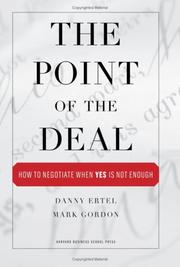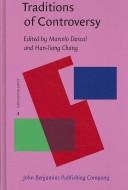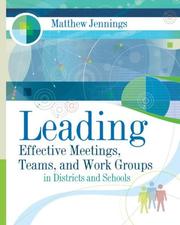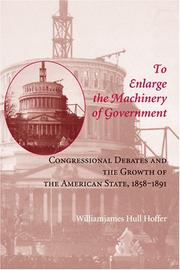| Listing 1 - 10 of 27 | << page >> |
Sort by
|

ISBN: 9780226869063 Year: 2007 Publisher: Chicago London University of Chicago Press
Abstract | Keywords | Export | Availability | Bookmark
 Loading...
Loading...Choose an application
- Reference Manager
- EndNote
- RefWorks (Direct export to RefWorks)
Book
ISBN: 9789025414993 9025414990 Year: 2007 Publisher: Amsterdam: Business Contact,
Abstract | Keywords | Export | Availability | Bookmark
 Loading...
Loading...Choose an application
- Reference Manager
- EndNote
- RefWorks (Direct export to RefWorks)
Conversation --- Success --- Gesprekstechniek --- Technique de la discussion --- Conversation Gesprek
Book
ISBN: 144062920X Year: 2007 Publisher: [Place of publication not identified] Penguin Group
Abstract | Keywords | Export | Availability | Bookmark
 Loading...
Loading...Choose an application
- Reference Manager
- EndNote
- RefWorks (Direct export to RefWorks)
Book clubs (Discussion groups) --- Children --- Books and reading

ISBN: 9781422102336 1422102335 Year: 2007 Publisher: Boston Harvard Business School Press
Abstract | Keywords | Export | Availability | Bookmark
 Loading...
Loading...Choose an application
- Reference Manager
- EndNote
- RefWorks (Direct export to RefWorks)
Negotiation in business. --- Negotiation. --- Negotiation --- Negotiation in business --- Business --- Management --- Bargaining --- Dickering --- Haggling --- Higgling --- Negotiating --- Negotiations --- Discussion --- Psychology, Applied

ISBN: 1282152475 9786612152474 9027291810 9789027218841 9027218846 9789027291813 Year: 2007 Publisher: Amsterdam Philadelphia John Benjamins Pub. Company
Abstract | Keywords | Export | Availability | Bookmark
 Loading...
Loading...Choose an application
- Reference Manager
- EndNote
- RefWorks (Direct export to RefWorks)
Controversies may be particularly prominent in one or another culture. Yet, there is hardly any culture where they do not exist. This book assumes that the practice of controversy, along with its theorization, constitutes - in each of the cultures and disciplines where it develops - a tradition. Whether there are enough shared elements in these traditions to consider them as, fundamentally, universal or not is something that can only be determined on the basis of a rich sample of controversies and theorizations thereof belonging to different traditions. This is what this volume provides to the reader. By presenting side by side controversies from the East and from the West, from the ancient past up to the present, from different domains of scholarship and action, the reader is in a position not only to admire the widespread nature, role, and richness of the phenomenon, but also to begin to evaluate its variety as well as universality. While the editors have purposefully avoided comparative studies of traditions of controversy, in order to focus on each tradition so to speak from its practitioners' point of view, some of the chapters take a bird's eye view and exemplify how such studies can be systematically conducted. In a world that is globalizing itself at a fast pace, the awareness of the multiplicity of traditions of controversy is fundamental for ensuring both that the integration of the various perspectives is harmonious and that each one of them is granted its place in a plural universe.
Polemics. --- Debates and debating. --- Propaganda --- Public opinion --- Argumentation --- Speaking --- Elocution --- Forensics (Public speaking) --- Public speaking --- Rhetoric --- Discussion --- Oratory

ISBN: 141660538X 9786610928675 1416606394 1416606408 1280928670 1416606416 9781416606390 9781416606413 9781416605386 1416617396 9781416617396 9781280928673 6610928673 9781416606406 Year: 2007 Publisher: Alexandria, VA Association for Supervision and Curriculum Development
Abstract | Keywords | Export | Availability | Bookmark
 Loading...
Loading...Choose an application
- Reference Manager
- EndNote
- RefWorks (Direct export to RefWorks)
This book is packed with strategies that school and district leaders at all levels can use to run effective staff meetings, inclusion teaching teams, and committees or task forces.
Meetings. --- Meetings --- Teaching teams --- Teachers --- School management and organization --- Education --- Social Sciences --- Theory & Practice of Education --- Planning --- Professional relationships --- Planning. --- Conferences --- Congresses and conventions --- Discussion

ISBN: 1421402416 0801886554 Year: 2007 Publisher: Baltimore : Johns Hopkins University Press,
Abstract | Keywords | Export | Availability | Bookmark
 Loading...
Loading...Choose an application
- Reference Manager
- EndNote
- RefWorks (Direct export to RefWorks)
Federal government --- Debates and debating --- United States. --- United States --- Politics and government --- Argumentation --- Speaking --- Elocution --- Forensics (Public speaking) --- Public speaking --- Rhetoric --- Discussion --- Oratory --- States' rights (American politics)
Book
ISBN: 9789087280239 9087280238 Year: 2007 Publisher: [Leiden]: Leiden University Press,
Abstract | Keywords | Export | Availability | Bookmark
 Loading...
Loading...Choose an application
- Reference Manager
- EndNote
- RefWorks (Direct export to RefWorks)
Logic --- Literary rhetorics --- Debates and debating --- Rhetoric --- Rhetoric. --- 82.085 --- Retorica. Argumentatieleer. Voordrachtkunst --- 82.085 Retorica. Argumentatieleer. Voordrachtkunst --- Language and languages --- Speaking --- Authorship --- Expression --- Literary style --- Argumentation --- Elocution --- Forensics (Public speaking) --- Public speaking --- Discussion --- Oratory --- Debates and debating - Netherlands
Book
ISSN: 13730258 ISBN: 9782804155230 2804155234 Year: 2007 Volume: *61 Publisher: Bruxelles : De Boeck,
Abstract | Keywords | Export | Availability | Bookmark
 Loading...
Loading...Choose an application
- Reference Manager
- EndNote
- RefWorks (Direct export to RefWorks)
Cet ouvrage pose la question de l'apprentissage par les enfants et les adolescents, plus généralement par les adultes, d'une réflexion visant à " penser par soi-même ". L'originalité de l'ouvrage est double : montrer que c'est possible et même souhaitable avec des enfants et des adolescents, pour " grandir en humanité " en tant qu'homme, et éduquer les élèves à une " citoyenneté réflexive" ; développer l'idée que cet entraînement à une pensée rigoureuse peut se faire par la discussion, et pas forcément par des cours, l'étude de grands textes ou la rédaction de dissertations, dès lors que l'on constitue le groupe-classe en " communauté de recherche " (Lipman), avec une " éthique discussionnelle " (Habermas), et que l'animateur fasse preuve de vigilance intellectuelle pour garantir une " visée philosophique " des échanges. Ce livre s'adresse à ceux qui s'intéressent à l'enfance, éducateurs, enseignants, parents, puisqu'il explore les possibilités de réflexion de jeunes élèves, enfants, adolescents. Mais aussi ceux qui s'intéressent à la philosophie, et à l'apprentissage du philosopher ainsi qu'à la discussion, puisqu'il présente celle-ci comme une des modalités de l'apprentissage
Argumentatie (Debatten en debatteren) --- Argumentation (Debates and debating) --- Argumentation (Débats et discussions) --- Debates and debating --- Debatten en debatteren --- Débats et controverses --- Débats et discussions --- Speading --- Philosophie --- Réflexion (Philosophie) --- Discussion. --- Étude et enseignement. --- Philosophy --- Study and teaching --- Étude et enseignement
Book
ISBN: 9087280238 9786611991388 1281991384 9048502144 9789048502141 9781281991386 Year: 2007 Publisher: [Leiden] : Leiden University Press,
Abstract | Keywords | Export | Availability | Bookmark
 Loading...
Loading...Choose an application
- Reference Manager
- EndNote
- RefWorks (Direct export to RefWorks)
De redelijkheid van Klassieke Retorica bevat een ongewone kijk op de klassieke retorica. Deze wordt nu niet gezien als een verzameling opportunistische adviezen om een zaak hoe dan ook te winnen, maar als een vroege bijdrage aan het opstellen van 'regels voor redelijke discussies'. Klassiek-retorische begrippen als stasis (geschil- of bewijslastpunt), enthymeem (enkelvoudige argumentatie), argumentatieve topen (argumentatieschema's) en schijnbare of foutieve argumentaties (drogredenen) worden geduid als evenzovele voorlopers van noties uit de moderne normatieve argumentatietheorie. Deze visie wordt ontwikkeld via een analyse van drie representatieve klassieke werken: de anonieme Rhetorica ad Alexandrum (rond 340 v. Chr.), de Rhetorica van Aristoteles (ongeveer 330 v. Chr.) en de retorica van Hermagoras van Temnos (iets na 150 v. Chr. geschreven, verloren gegaan, maar grotendeels te reconstrueren). The reasonableness of Classic Rhetoric contains an unusual view of classical rhetoric. This is now not seen as a collection of opportunistic advice to win a case anyway, but as an early contribution to drafting 'rules for reasonable discussions'. Classical rhetorical concepts such as stasis (dispute or burden of proof), enthusyme (simple argumentation), argumentative topen (argumentation schemes) and apparent or erroneous argumentations (fallacies) are interpreted as just as many precursors of notions from modern normative argumentation theory. This vision is developed through an analysis of three representative classical works: the anonymous Rhetorica ad Alexandrum (around 340 BC), the Rhetorica of Aristotle (about 330 BC) and the rhetoric of Hermagoras of Temnos (just after 150 BC, written, lost, but largely to be reconstructed).
Debates and debating -- Netherlands. --- Debates and debating. --- Rhetoric. --- Debates and debating --- Language and languages --- Speaking --- Argumentation --- Rhetoric --- Authorship --- Expression --- Literary style --- Elocution --- Forensics (Public speaking) --- Public speaking --- Discussion --- Oratory
| Listing 1 - 10 of 27 | << page >> |
Sort by
|

 Search
Search Feedback
Feedback About UniCat
About UniCat  Help
Help News
News